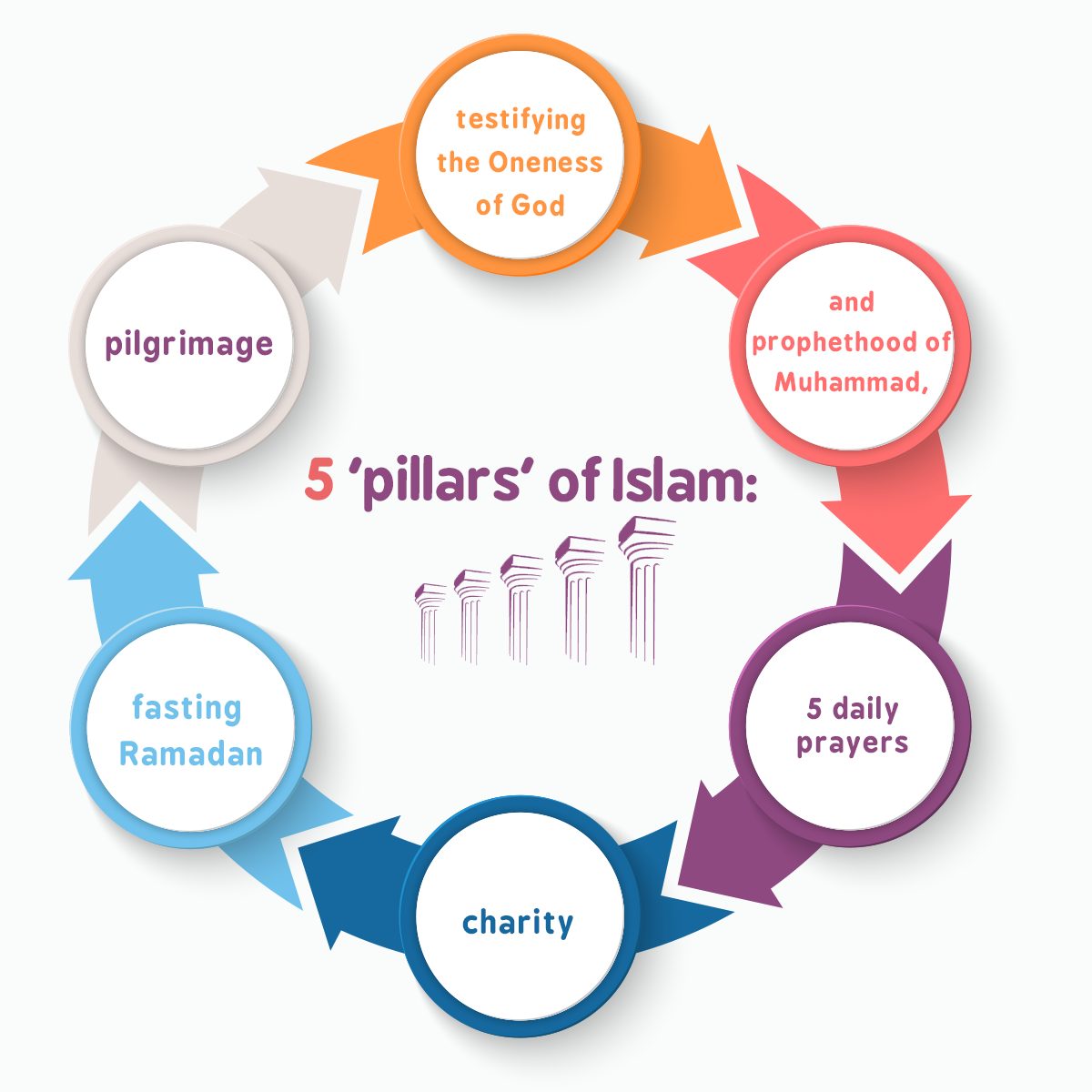Learn Quran, Arabic & Islamic Online
Islam 5 Pillars Of Faith
Table of Contents
ToggleEvery single thing in this world has some essentials which constitute its basics and foundations. Whether it be any philosophical concept or a truly universal religion i.e. Islam. Allah SWT has specified a few acts in Islam that are necessary to do for every person to be called a Muslim.
When any building is being constructed, we create pillars for that building to be strong. Similarly, Islam has 5 pillars that are compulsory for all Muslims to follow to be faithful and strong Muslims.
The Five Pillars – the Declaration of Faith (Shahada), Prayer (Salah), Alms-giving (Zakat), Fasting (Sawm) and Pilgrimage (Hajj) – constitute the basic norms of Islamic practice. They are accepted by Muslims globally irrespective of ethnic, regional, or sectarian differences.
If one wants to have the highest ranks in the eyes of Allah, he should strongly believe in the pillars of Islam because if the pillars are not strong of any building then the building itself is weak similarly as Muslims we should work on our pillars of Islam to make them strong as much as we can.
Prophet Muhammad (PBUH)said,
“Islam is based on five fundamentals: to proclaim that there is no god but Allah and Muhammad (PBUH’s) is the Messenger of Allah, and to establish the prayer, and pay Zakat, to offer pilgrimage of the House [of God] and to fast during Ramadan.” (Sahih Bukhari, No: 7)
What Are The Five Pillars Of Islam?
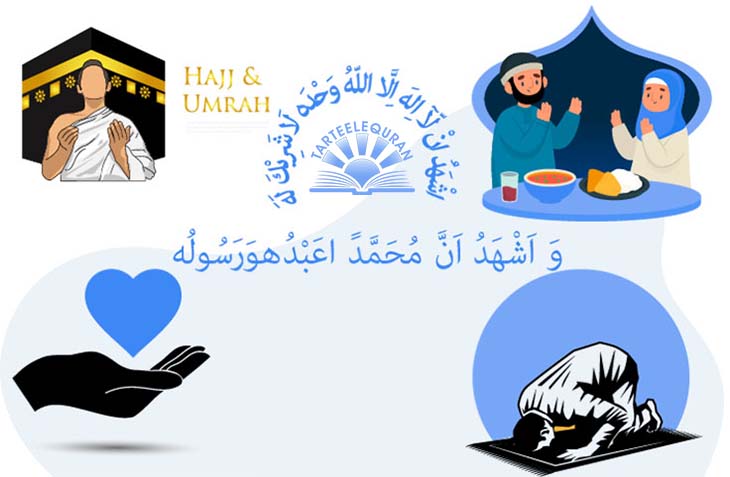
The five pillars of Islam are those fundamental principles and the primary beliefs upon which the building of Islam religion stands. Fulfilling these primary obligations of faith (Eman) is mandatory for every Muslim. Denying the importance or violating their boundaries results in exclusion and banishment from the religion and any participation in its sacraments.
There are five key practices that all Muslims are obligated to fulfill throughout their lifetime. These practices are referred to as pillars because they form the foundation of Muslim life. The five pillars of Islam are Shahada, Salah, Zakat, Sawm, and Hajj.
Start learning Quran, Arabic and Islamic Studies from the comfort of your Home with the Best Online Islamic School.
List Of The Five Pillars Of Islam
1- SHAHADA (Profession of Faith)
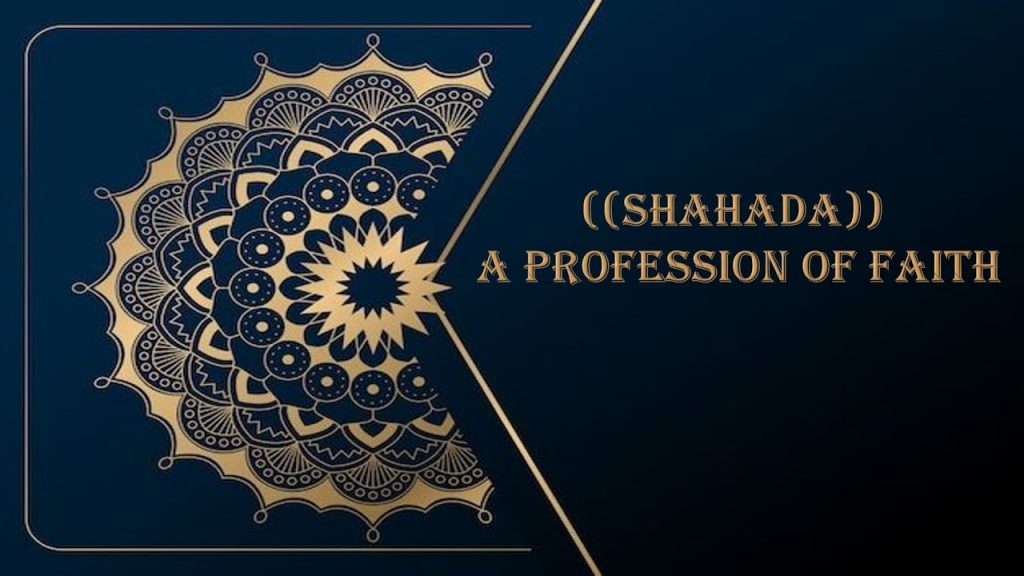
The first and the most important pillar of Islam is Shahadah, the belief in Allah and His Messenger (SAW). When any person enters Islam, he has to believe wholeheartedly that:
“I bear witness that there is no God except Allah, and I bear witness that Prophet Mohammad (SAW) is His messenger.”
When you take Shahada, one must accept that there is only one God, and he is the only creator of this entire world, as stated in Quran:
“Say, ‘He is God the One, God the eternal. He begot no one nor was He begotten. No one is comparable to Him’” (112:1-4).
Secondly, after accepting that there is only one God, you have to accept that the Prophet Mohammad (SAW) is the last and final messenger of Allah, and no other messenger will be sent till the day of resurrection. As Allah has stated in Quran:
“Muhammad is not the father of any of your men, but he is the Messenger of Allah and the Last of the prophets, and Allah is cognizant of all things.”(33:40).
Muslims reiterate the belief that there is no God but Allah, and the prophet Muhammad is the messenger of God, which makes up the central theme of Islam. This narrative is the essence of the religion and that one basic framework around which the whole structure of Islam builds.
Whoever believes in Shahadah will be saved from hell, as Allah has stated in Quran:
“So whoever disbelieves in the taught (anything worship besides Allah) and believes in Allah, then he has grasped the firmest handhold which will never break” (2: 256)
If a Muslim recites La Ilaha Illa Allah, it is one of the best deeds. The Prophet (SAW) stated in the Hadith:
“When a person sincerely says ‘La Ilaha Illa Allah,’ the doors of the sky are opened for it until it reaches the Throne so long as he avoids major sins”(Sunan Tirmidhi, Hadith: 3590. Graded sound -Hasan- by Imam Tirmidhi)
There are two parts of the first half of the testimony of faith:
The first part is “Laa ilaha illa Allah”.
This part of the testimony nullifies all forms of worshipping anything or anyone other than Allah. With this phrase, you are affirming that Allah alone is the Creator, Ruler, and Sustainer of all things.
The second part is: “Mohammed Rasol Allah” peace be upon him.
This second part means to believe in this statement is to bear witness that Mohammed is the messenger of Allah, which means to follow what he says through obeying him in what he says to us to do and to avoid what He forbids.
2- SALAH (Prayer)
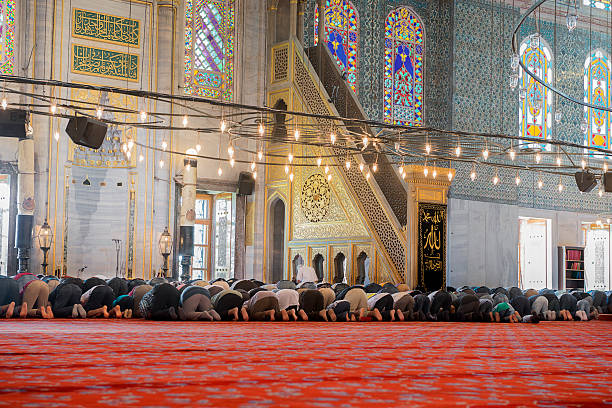
On the occasion of Isra Wal Mairaj, Allah SWT gifted his beloved Prophet and His Ummah the five prayers of the day. He also made it obligatory for every Muslim to offer these five prayers a day while facing Kaaba.
The Holy Prophet has highlighted the importance of Salah in hundreds of his Hadiths. A ritual of praying to Allah SWT purifies our heart and soul. It ultimately helps us to be better Muslims.
Praying five times a day while facing toward Mecca city of Saudi Arabia is considered the second most important pillar of Islam and a subject of great value after Shahada.
Prayers are offered on a clean and stainless piece of rug. Preferably, it would help if you allocated a separate mat to avoid the worry of keeping it pure. Women are advised to pray individually at home. Men shall make their way out towards the mosque upon hearing the Adhan (call to prayer) but may skip this clause and pray at home under some compelling circumstances.
Salah’s basic scope is to create a remembrance of Allah from the busy routine of the Muslim. It is a call from Allah to all Muslims to come to pray and thank Allah, Who has created them. Salah is a test for a Muslim that whether a Muslim loves Allah or his routine is more important to them. If a Muslim prays on time and passionately, then eases his hardships and fulfills all his desires. The importance of praying Salah on time is mentioned in the following hadith:
“Once Abdullah (R.A.) asked the Prophet Muhammad (SAW), “Which deed is the dearest to Allah?” He replied, “To offer the prayers at their early stated fixed times.” (Sahih al-Bukhari 527).
Salah is a source to get Piety (Taqwa) which is one of the most important objectives in Islam. To achieve the highest level of Piety, one has to pray five times a day; Allah mentions in the Quran:
“This is the Book in which there is no doubt, a guidance for those who have Taqwa: who believe in the unseen, and who establish Salah, and spend out of what we have provided for them.” (2:2-3)
Salah is a way of communication with Allah. You can talk to Allah through Salah; Allah listens to you; he always listens to the prayer as mentioned in Quran:
“When My servants ask thee [O Muhammad] concerning Me, [tell them] I am indeed close: I listen to the prayer of every suppliant when he calls on Me: Let them also, with a will, Listen to My call, and believe in Me: That they may walk in the right way” (Quran 2:186)
So, to have peace and righteousness in life, one should pray five times a day. Salah brings prosperity in this world and hereafter.
3- ZAKAT (Charity – Alms)

Islam makes every well-heeled Muslim responsible for distributing a fixed share of his income among those who need financial help. This charity should be by Islamic law, interpreted by scholars as instructed in the books.
Apart from that, opulent Muslim members of society opt to develop public service facilities to secure more blessings besides donating Zakat. Building hospitals, schools, shelter houses, drinking fountains, and almshouses (building of a residence for the poor, sick, and elderly relying on public funding) to serve humanity.
In Quran, most of the time, whenever there is an order to pray Salah, there is always mention of Zakat; it shows that as much as Salah is important for the Muslim same goes for Zakat, as Salah creates a remembrance of Allah. Similarly, Zakar decreases the love for money and increases the level of Piety as mentioned in the Quran:
“And establish prayer and give zakat, and whatever good you put forward for yourselves – you will find it with Allah.” (2:110, Qur’an)
As Salah is the purification of the soul, Zakat is the purification of money. Whenever a Muslim gives, Zakat Allah gets closer to him because he is not valuing his money but valuing the orders of Allah. It is a nature of a person that he loves his money. Allah knows the nature of man. That’s why he has created the system of Zakat to test the believers. Through this test, Allah can judge the true believers of Islam, and it rewards the true believer with the best; as Prophet (SAW) said:
“Whoever gives away charity the size of a date, which is earned lawfully, since Allah only accepts the good lawful things, Allah will indeed take it with His right hand and cause it to grow for its owner, just as one of you raises his colt, to the point that the charity will become like the size of a mountain.” [Reported by Al-Bukhari and Muslim]
Zakat helps a Muslim in getting forgiveness from Allah as there is hadith of the Prophet (SAW):
“Giving charity wipes away sins just as water extinguishes fire.”
Zakat is not an optional thing in Islam; it is a mandatory pillar of Islam. It is created obligatory because Allah wants to check whether this person loves money or Me; apart from this beautiful law of Islam, it helps society decrease poverty from society. Through. Zakat people get help; if all Muslims give Zakat regularly, society may overcome the poverty rate at one point. As Allah has mentioned in the Quran:
“The alms are only for the Fuqara (the poor), and Al-Masakin (the needy) and those employed to collect (the funds), and to attract the hearts of those who have been inclined (towards Islam); and to free captives; and for those in debt; and for Allah’s cause, and for the wayfarer (a traveler who is cut off from everything); a duty imposed by Allah. And Allah is All-Knower, All-Wise.” (9:60)
The many benefits of giving zakat include some benefits:
- Alms are a way of purifying one’s own wealth, it’s one of the Duties of All rich Muslims.
- Promoting a balanced society with equality and fairness.
- Learning to share and help one another; observing society.
4- SAWM (Fasting)

In the ninth month of the Islamic calendar, Muslims are commanded to keep fast from pre-dawn to sunset. All healthy and adult Muslims are ordered to abstain from eating, drinking, and even performing evil deeds.
Through fasting, Muslims experience hunger and thirst and feel the agony their fellow Muslims experience daily because of a lack of resources. This temporary deprivation revitalizes their belief in Allah and provides a reason to express their utmost gratitude for every blessing that Allah has given to them.
Uthman ibn Abu Al-Aas reported: “The Messenger of Allah (peace and blessings be upon him) said: ‘Fasting is a shield from the Hellfire just like the shield of any of you in battle.'” (Sunan Ibn Majah, 1639)
Fasting is a way to create Piety in oneself. As Allah creates Fasting to guard himself against bad deeds and create control over his desires, as mentioned in the hadith:
Abu Huraira (may Allah be pleased with him) reported: “The Messenger of Allah (peace and blessings be upon him) said: ‘When one of you awakes in the morning for fasting, then he should not use obscene language or behave ignorantly. If anyone slanders him or tries to argue with him, he should say: Indeed, I am fasting! Indeed, I am fasting!” (Sahih Muslim)
Fasting in the month of Ramadan has a glorious reward, and if a person fasts passionately, then he will straight enter paradise, as Sahl Ibn Saad (R.A.) that the Prophet (S.A.W.) said:
” There is a gate in Paradise called Ar-Raiyan, and those who observe fasts will enter through it on the Day of Resurrection, and none except them will enter through it. It will be said, ‘Where are those who used to observe fasts?’ They will get up, and none except them will enter through it. After their entry, the gate will be closed, and nobody will enter through it.” (Sahih Bukhari: 1896)
5- HAJJ (Pilgrimage)
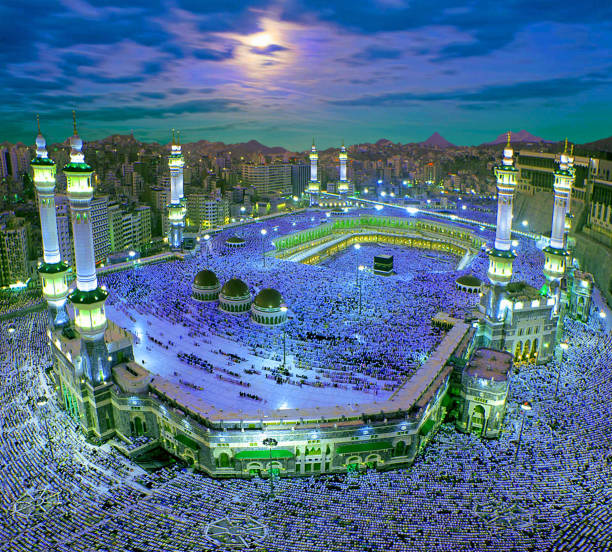
Performing Hajj is the last pillar of Islam and one core part of Islamic beliefs. Those financially strong and resourceful Muslims are recommended to perform hajj at least once in a lifetime. Hajj is a visit by Muslims to the holy city of Mecca in the month of Zil hajj.
According to the belief that Muslims have the Kaaba, which is a cubical structure with black hangings over it embellished with the verses of the Holy Quran, it was built by Abraham R.A, and he declared it the house of God, hence they face the direction of Kaaba when they pray. The Quran mentions the importance of Hajj:
“When We made the House [i.e., the Ka’ba] a place of return for the people and [a place of] security. And take, [O believers], from the standing place of Abraham a place of prayer. And We charged Abraham and Ishmael, [saying], ‘Purify My House for those who perform tawaf and those who are staying [there] for worship and those who bow and prostrate [in prayer].” (Qur’an 2:125)
It’s a 1500 years old practice since the time of the proclamation of Islam; Muslims from all over the world gather around the Kaaba and chant sacred words as a pledge of their loyalty to Allah almighty in the final month of the Islamic calendar (Labbayka Allahumma Labbayk).
Five Pillars Of Islam For Kids & Adults
We Have Special Islamic Studies Courses For Kids & Adults.
If you would like to have the opportunity to learn Quran, Arabic, or Islamic Studies with the best and the most proficient online teachers, start your journey today towards learning and seize the chance to get a FREE Trial Class to learn more about the Quran, Fiqh, Tafseer, Aqidah, and many other topics of Islam and Religion.
Enroll in our Islamic Studies Course Now!
You May Like To Read
10 Benefits Of Memorizing Quran
Recommended Courses
FAQs
The Five Pillars Of Islam In Arabic
- الشهادة
- الصلاة
- الزكاة
- الصيام
- الحج
The Five Pillars Of Islam In Order
Shahada (Faith)
Salah (Prayer)
Zakat (Almsgiving)
Sawm (Fasting)
Hajj (Pilgrimage)
Why Is The Five Pillars Of Islam Important
A Muslim must commit to the teachings of each pillar of Islam throughout his life. It’s not a one-time show but entails careful observance to stay in the shade of glorious Islam.
These five pillars mark the boundaries of religion and explain what discriminates a Muslim from others. No Muslim can hold his religious identity without ensuring that their life is spent within this framework.
Facts About The Five Pillars Of Islam
Upholding the pillars is considered obligatory for all sincere followers of the Prophet Muhammad, male and female, Sunni and Shi‘a, but that doesn’t mean that all those who identify as Muslims keep them consistently. As in all religions, circumstances vary and some people are more committed than others. Such things as age, stage of life, work, family responsibilities, health, and wealth all make a difference.

